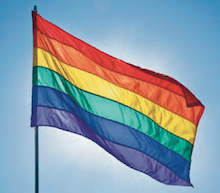July 3, 2015

“Just as I can’t fathom living in a time where blacks and whites can’t marry, I’m happy to know that my son (who is one year old) will feel the same about same-sex couples,” Madison resident Kady DeBerge said.
Friday, June 26, The U.S. Supreme Court made a historic decision overturning same-sex marriage bans nationwide, declaring marriages between same-sex couples legal.
“It’s not gay marriage anymore. It’s just marriage,” Executive Director of Outreach Steve Starkey said. In a split ruling, five out of the nine justices ruled in favor of recognizing marriage as a fundamental constitutional right for both opposite and same-sex couples.
“Marriage equality is an important milestone and affects many people who choose to have their loving relationships recognized in this way,” said Assistant Dean and Director of the LGBT Campus Center at UW-Madison Gabriel Javier. “I was surprised at how emotional the moment of decision was for me, as I saw so many of my friends overwhelmed by the gravity of this point in history.”
In Wisconsin, same-sex marriage has been recognized legally since last fall after a lawsuit challenging the state’s ban. The U.S. Supreme Court decision gives married same-sex couples equal federal rights to opposite-sex married couples including hospital visitation, spousal social security payments, custodial rights to children, shared property, and more.
“It was very complicated for gay couples,” Starkey said.
He explained same-sex couples faced difficulties in the past with legal matters opposite-sex married couples did not such as filing joint taxes, adoption, and spousal recognition. Due to varying laws in other states, same-sex couples legally married in other states were not recognized in other states. Starkey said this made it challenging for same-sex couples who traveled or intended to move.
“Just as I can’t fathom living in a time where blacks and whites can’t marry, I’m happy to know that my son (who is one year old) will feel the same about same-sex couples,” Madison resident Kady DeBerge said.
Though many citizens have opened up to the concept of same-sex marriages, opposition to the U.S. Supreme Court’s ruling still exists. In fact, the four justices against the ruling shared their dissenting opinions, many citing tradition, religion, social implications, and legal complications.
In opposition, Chief Justice John G. Roberts, Jr. said the constitution had nothing to do with the legalization of same-sex marriage, calling it an “an act of will, not legal judgement.” Chief Justice Clarence Thomas suggested same-sex couples were not deprived of their liberties or human dignity.
“Slaves did not lose their dignity (any more than they lost their humanity) because the government allowed them to be slaves,” Justice Thomas wrote in dissent comparing the LGBTQ rights to the struggle for civil rights.
Starkey believes same-sex couples will face obstacles and resistance from religious leaders, businesses, and/or officials in communities who opposed same-sex marriage, but the U.S. Supreme Court’s decision will help for a quicker transition than the last decade.
“The march for freedom moves forward. It’s not over, but I’m proud we finally won this achievement for human rights,” said Madison resident Colin Bowden.
DeBerge and Bowden expressed positive feelings toward the legalization of same-sex marriage, but others agreed there are more battles to be fought. Many feel the U.S. Supreme Court’s decision is indeed a great victory.
“I’m hoping that LGBTQ+ communities and our allies can bring this energy to the many other justice issues faced by LGBTQ+ communities, like immigration, employment non-discrimination, and trans inclusion,” Javier said.
Others had heartwarming sentiments about the historic decision made and look forward to the days ahead:
“Politics (and politicians) will always divide us as a people. Only love will unite us,” said Madison resident Frank Parr.

